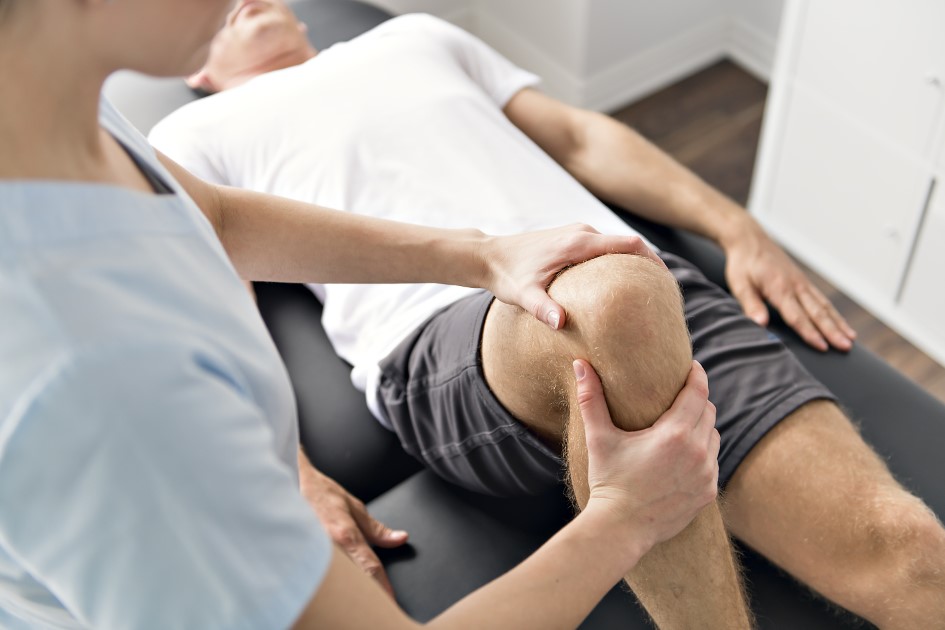Episode Transcript
Interviewer: Have you ever stood up and heard your knees pop or walked up a flight of stairs and noticed maybe a clicking sound in your ankle? It's a pretty common experience. But what do these sounds actually mean when it comes to joint health?
Today we're going to be talking with Dr. Chris Gee. He is a sports medicine specialist with University of Utah Health.
Differentiating Normal Joint Sounds from Potential Issues
Now, Dr. Gee, I mean, I don't know, it's like any noise that I hear in, say, my car is something I need to go get looked at, right? But what about when it comes to your joints, like if there's a clicking or a rattling or something like that?
Dr. Gee: Yeah. This can be a really disconcerting thing. And I have to laugh. My wife, I can hear her coming down the stairs because her ankle clicks all the time.
Interviewer: Oh, wow.
Dr. Gee: But it's not always a problem. So most of the time . . . Well, within the knee, for example, there's a number of structures that can move back and forth. Things like the kneecap, and the meniscus, can shift a little bit. And sometimes, even as fluid shifts, there are different pressure differentials, and it can pop and click and make noises. So it's not always a problem, but there are definitely times when we need to be aware of it and be cautious with it.
Interviewer: And when are those times? Like what are the points where it's not just, you know, popping of a knuckle or a sound like that, but it's something that you should go get looked at?
Dr. Gee: I guess, number one, if it comes after an injury and it's a new phenomenon where you're getting clicking that you've never had before, that's something to get looked at. If it gives you a sensation that the knee is getting stuck or it does get stuck, meaning you can't move it because something popped and something is stuck in there, that's a concern. And then if it's causing a lot of pain or swelling in the knee, then you should definitely get those checked out.
Interviewer: So if it's new, if it's causing immobility or swelling. Is there anything else?
Dr. Gee: No, not really. You know, there's a lot of times where you're just getting a little wear in the knee and it's starting to click and make some noise. And I try to tell people, "Don't worry about it too much." But it can be disconcerting sometimes.
When to Seek Medical Attention for Joint Noises
Interviewer: Sure. And so when we talk about this locking up or this, you know, kind of pain or swelling, what could be causing that noise and those sensations, and how important is it to get treated now rather than later?
Dr. Gee: Yeah. So the benign things that will cause clicking in the knee, like I mentioned, are the meniscus or the kneecap moving around. In the ankle, some of the tendons on the side will pop as they move back and forth, and usually those don't hurt too much. It'll just be a pop and make noise. The things that get stuck are usually some kind of cartilage that has been torn. Now that could be a lining of the joint, the actual articular cartilage that's broken free from an injury or wear and tear, and now it's moving around in the joint and getting stuck in the mechanism. The other common ones are things like a meniscus, which is a piece of tissue of cartilage within the knee that acts as a shock absorber, but it can get torn and kind of wedge itself in the joint and cause pain and locking of the joint.
Interviewer: Is there, I guess, a threshold where when someone notices something like this, they should go to a specialist?
Dr. Gee: Yeah. You know, those big red flags, as I mentioned, pain, swelling, new after an injury, or locking the joint would be things to get in and be seen. But honestly, if it's something that's bothering you and you don't know what it is, that's perfectly reasonable to come in and get looked at. I have people all the time who come in and say, "This knee has clicked forever. I don't know what is going on." And we check it out, we make sure it's nothing to worry about, and then they're at least reassured that they can go forward with it.
